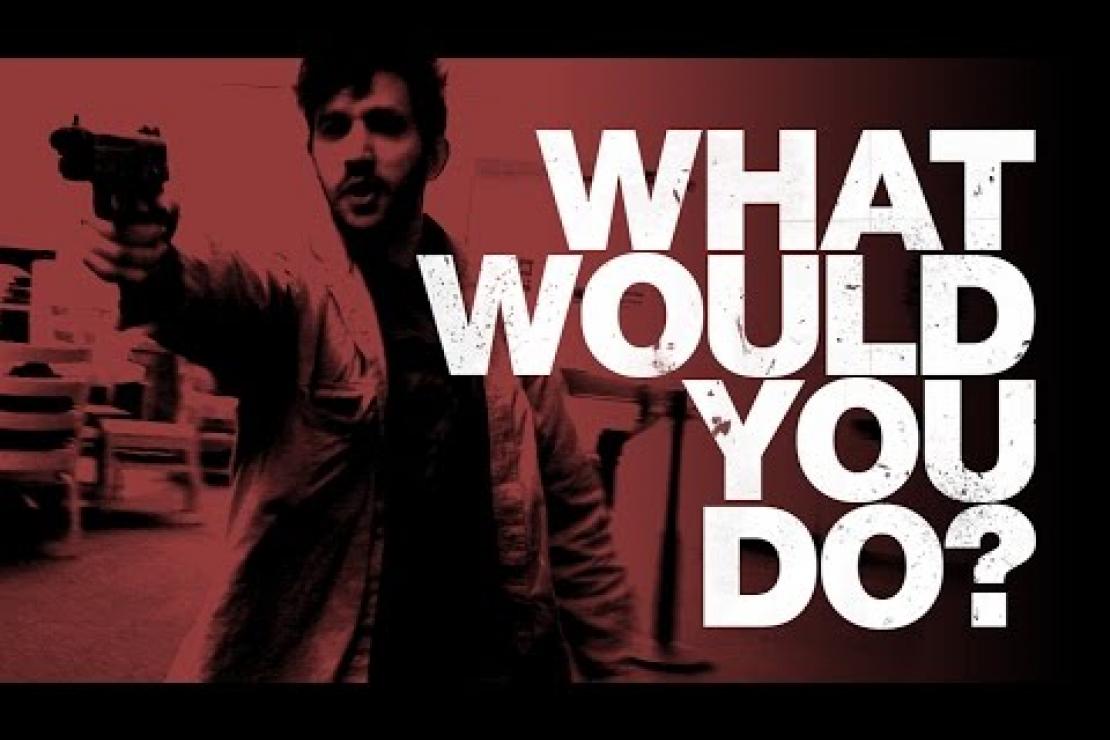ACTIVE SHOOTER: WHAT TO DO
The potential for a school shooting exists on every campus throughout the United States. Although the possession of firearms on or around the campus is prohibited, previous local and national shootings dictate the importance and need for a response plan. In the event you observe an individual with any type of weapon on the campus, immediately contact the College Sheriff's Office at extension 2911 from an internal telephone, or (818) 947-2911 from a cell phone; and right now set this phone number on speed dial in your cell phone.
IF YOU HEAR GUN SHOTS OR WHAT MIGHT BE GUN SHOTS ASSUME THAT THERE IS A SHOOTER ON CAMPUS UNTIL YOU ARE TOLD OTHERWISE BY SHERIFFS PERSONNEL, POLICE, OR CAMPUS ADMINISTRATION.
Make a decision, trusting your instincts, to take action to protect yourself to survive the situation. DO NOT APPROACH THE SHOOTER. You generally will have three options depending on whether you are outdoors or indoors and how close you are to the actual shooter:
- Get away: Can you safely escape?
- Hide in a safe place: Is there a good place to hide?
- Lock down in a room: Are you in a room that can be locked?
Get Away
- If you can and you deem it safe, get out and get to a safe place.
- You will have to rely partially on instinct.
- Leave belongings behind, but take your cell phone if it is handy.
( Turn off the cell phone ringer. ) - If moving, move quickly and try to stay concealed while you move.
- Before you move know where you are going and look before you move.
- If safe to do so, call the Sheriff's Office at extension 2911 or (818) 947-2911. Do not assume that someone else has reported the incident.
- Wait and listen for directions from law enforcement personnel.
Hide in a Safe Place
- Find a hidden location and hide. If possible hide in a place that offers protection as well concealment.
- If safe to do so, call the Sheriff‘s Office at extension 2911 or (818) 947-2911. Do not assume that someone else has reported the incident.
- Wait and listen for directions from law enforcement personnel.
Lock down in a Room
- If in a room stay in the room and lock the door if it is safe to do so.
- If you are not in a room find a room that locks if you can.
- Find a hidden location inside the room.
- Find protection behind furniture if possible.
- If possible blockade the door with furniture or other heavy objects.
- Close the blinds, turn off the lights, remain quiet, silence cell phones, spread out away from other individuals, and move behind available cover. Stay on the floor, away from doors or windows, and do not peek out to see what may be happening.
- If you are confronted by the shooter comply with the shooter‘s instructions.
- If safe to do so, call the Sheriff‘s Office 2911 or (818) 947-2911. Do not assume that someone else has reported the incident.
- Wait and listen for directions from law enforcement personnel.
AS A LAST RESORT TO TRY TO SAVE YOUR LIFE, FIGHT
- Whether alone or with a group
- Act with aggression
- Improvise weapons
- Commit to your actions
OTHER IMPORTANT CONSIDERATIONS
If Outdoors When a Shooting Occurs
- Drop to the ground immediately, face down as flat as possible. If within 15-20 feet of a safe place or cover, duck and run to it.
- Move or crawl away from gunfire, trying to utilize any obstructions between you and the gunfire. Remember that many objects of cover may conceal you from sight, but may not be bulletproof.
- When you reach a place of relative safety, stay down and do not move. Do not peek or raise your head in an effort to see what may be happening.
- If safe to do so, call the Sheriff‘s Office 2911 or (818) 947-2911. Do not assume that someone else has reported the incident.
- Wait and listen for directions from law enforcement personnel.
If Shooter is in Close Proximity
DO NOT APPROACH THE SHOOTER– Your survival is the key component, so unless you are left with no choice you should avoid approaching the shooter. However, if you are approached by the shooter comply with the shooter‘s instructions.
OTHER CONSIDERATIONS
Help Out – If you can do so without placing yourself in jeopardy
- Warn others.
- Help others escape.
- Keep others away from the danger area.
- Help the injured.
- Help others stay calm.
Calling for Help
If safe to do so, call the Sheriff‘s Office at extension 2911 or (818) 947-2911. Do not assume that someone else has reported the incident.
- Be persistent; phones may be jammed.
- Calmly identify yourself and your exact location. Remain calm and answer the questions. The person answering the phone is trained to obtain the necessary and required information for an appropriate emergency response.
If safe to do so, stop and take time to get a good description of the criminal. Note height, weight, sex, race, approximate age, clothing, method and direction of travel, and his/her name, if known. If the suspect is entering a vehicle, note the license plate number, make and model, color, and outstanding characteristics. All of this takes only a few seconds and is of the utmost help to the responding officers.
Although you are not expected to know all of the answers, answer them to the best of your ability. Even though you may think the questioning is wasting valuable time, the information you provide will enable the Sheriff‘s Office to dispatch officers and other emergency personnel safely and effectively.
During your call, you may be asked questions, such as:
- What exactly is happening and how do you know? Is it still happening?
- Where are you located?
- Where is the suspect now? What was his/her last known direction of travel?
- Are there any wounded and how many?
- What is the specific location of occurrence?
- What types of weapons were used? Describe the weapon/s or other dangerous object/s if possible, and any visible ammunition:
- Rifle
- Shotgun
- Handgun: revolver or automatic.
- Ammunition: Describe type, amount and type of container (metal box, cardboard box, backpack pockets and others).
- Knife or other dangerous weapons.
- Explosive device: Give specific description.
- Were any shots fired? Describe the sound and the number of shots fired.
- Do you know who the suspect/s is? If yes, identify them and provide any background knowledge you may have.
When Law Enforcement Arrives – They may be the College Sheriff’s, Security Officers, or Officers from other law enforcement agencies
- When law enforcement reaches you, do not run at them or make sudden movements and wait for their instructions.
- The priority of the first responders will be to identify the shooter. Law enforcement will need to ensure that you are not the shooter.
- Do not scream, yell, point, or wave your arms.
- Do not hold anything in your hands that could be mistaken for a weapon (including cell phones).
- Be quiet and compliant.
- Show the officers your empty hands and follow their instructions.
- Any information you can provide about the shooter could be useful, offer the information if you have any.
- Give the number of shooters.
- Give the location and physical description of the shooter.
- Give the number and types of weapons.
- When it is safe to do so, you will be given instructions as to how to safely exit your location.
In the Event that there are Hostages
Call the College Sheriff at extension 2911 or (818) 947-2911 and be prepared to give the following information if you have it:
- Identify hostage location in building or area.
- Number of assailants, if known.
- Number of hostages, if known.
- Identity of assailants, if known.
- Any description of assailants and weapons.
- Any demands made by the assailant/s.
- If you are at a distance, move away from the location to a safer area.
- If you can do so safely, evacuate area to a safer location.
- If possible provide the above information once you are in a secure location.
What to do if you are taken Hostage
- Be patient. Time is on your side. Avoid drastic action.
- The initial 45 minutes are the most dangerous. Follow instruction, be alert and stay alive. The captor is emotionally imbalanced. Don‘t make mistakes which could endanger your well being.
- Don‘t speak unless spoken to and then only when necessary. Don‘t talk down to the captor who may be in an agitated state.
- Avoid appearing hostile. Maintain eye contact with the captor at all times if possible, but do not stare. Treat the captor like royalty.
- Try to relax. Avoid speculating.
- Comply with instructions as best you can. Avoid arguments. Expect the unexpected.
- Be observant. The personal safety of others may depend on your memory. You may be released or escape. The captors in all probability do not want to harm persons held by them.
- Be prepared to answer the Sheriff on the phone.
- Be patient, wait. Attempt to establish rapport with the captor.
- If medications, first aid, or bathroom privileges are needed by anyone, say so.

